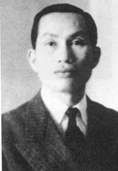Đặng Văn Ngữ
Đặng Văn Ngữ (1910–1967) was a prominent Vietnamese physician and professor, renowned for his significant contributions to the field of public health in Vietnam. He is best remembered for his pioneering work in combating malaria, a major health issue in Vietnam during his lifetime. Đặng Văn Ngữ's efforts in medical research, public health policy, and education have left a lasting impact on the Vietnamese medical community and its fight against infectious diseases.
Early Life and Education[edit | edit source]
Đặng Văn Ngữ was born in 1910 in Hanoi, Vietnam, during a time when the country was under French colonial rule. From a young age, he showed a keen interest in the sciences and was particularly drawn to medicine, a field that promised the potential to significantly improve public health conditions in Vietnam.
He pursued his medical education at the University of Hanoi, where he excelled in his studies. After graduating with his medical degree, Đặng Văn Ngữ furthered his education in France, where he specialized in epidemiology and public health. His time in France was instrumental in shaping his future career, as it exposed him to advanced research methodologies and public health strategies.
Career[edit | edit source]
Upon returning to Vietnam, Đặng Văn Ngữ dedicated himself to the fight against infectious diseases, with a particular focus on malaria. At the time, malaria was a rampant health crisis in Vietnam, causing widespread morbidity and mortality. Đặng Văn Ngữ's work involved extensive field research, through which he sought to understand the epidemiology of malaria in Vietnam. His research contributed to the development of more effective malaria control strategies, which included the use of DDT for mosquito control, improvements in public health infrastructure, and the establishment of malaria clinics throughout the country.
In addition to his research, Đặng Văn Ngữ was a passionate educator. He served as a professor at the University of Hanoi, where he trained the next generation of Vietnamese physicians and public health professionals. His teachings emphasized the importance of combining clinical medicine with public health principles to address the root causes of diseases.
Legacy[edit | edit source]
Đặng Văn Ngữ's contributions to medicine and public health in Vietnam were profound. He is credited with significantly reducing the incidence of malaria in Vietnam during his lifetime, saving countless lives. Beyond his specific work on malaria, Đặng Văn Ngữ's approach to public health—focusing on preventive measures, community engagement, and the integration of public health with clinical medicine—has influenced the development of Vietnam's health care system.
His legacy is honored in Vietnam, where he is remembered as a pioneer in the field of public health and a national hero. Several institutions, including schools and health facilities, have been named after him, ensuring that his contributions to Vietnamese medicine and public health are remembered and celebrated.
Death[edit | edit source]
Đặng Văn Ngữ passed away in 1967, but his work continues to inspire public health efforts in Vietnam and around the world. His life and career serve as a testament to the impact that dedicated individuals can have on improving public health and combating infectious diseases.
Search WikiMD
Ad.Tired of being Overweight? Try W8MD's physician weight loss program.
Semaglutide (Ozempic / Wegovy and Tirzepatide (Mounjaro / Zepbound) available.
Advertise on WikiMD
|
WikiMD's Wellness Encyclopedia |
| Let Food Be Thy Medicine Medicine Thy Food - Hippocrates |
Translate this page: - East Asian
中文,
日本,
한국어,
South Asian
हिन्दी,
தமிழ்,
తెలుగు,
Urdu,
ಕನ್ನಡ,
Southeast Asian
Indonesian,
Vietnamese,
Thai,
မြန်မာဘာသာ,
বাংলা
European
español,
Deutsch,
français,
Greek,
português do Brasil,
polski,
română,
русский,
Nederlands,
norsk,
svenska,
suomi,
Italian
Middle Eastern & African
عربى,
Turkish,
Persian,
Hebrew,
Afrikaans,
isiZulu,
Kiswahili,
Other
Bulgarian,
Hungarian,
Czech,
Swedish,
മലയാളം,
मराठी,
ਪੰਜਾਬੀ,
ગુજરાતી,
Portuguese,
Ukrainian
Medical Disclaimer: WikiMD is not a substitute for professional medical advice. The information on WikiMD is provided as an information resource only, may be incorrect, outdated or misleading, and is not to be used or relied on for any diagnostic or treatment purposes. Please consult your health care provider before making any healthcare decisions or for guidance about a specific medical condition. WikiMD expressly disclaims responsibility, and shall have no liability, for any damages, loss, injury, or liability whatsoever suffered as a result of your reliance on the information contained in this site. By visiting this site you agree to the foregoing terms and conditions, which may from time to time be changed or supplemented by WikiMD. If you do not agree to the foregoing terms and conditions, you should not enter or use this site. See full disclaimer.
Credits:Most images are courtesy of Wikimedia commons, and templates Wikipedia, licensed under CC BY SA or similar.
Contributors: Prab R. Tumpati, MD

